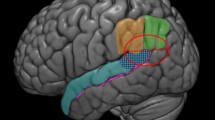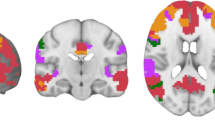Abstract
Impulsiveness has been linked to fast guesses and premature responses in reaction time tasks like the Eriksen flanker task or the Go/Nogo task. In the present study, healthy subjects without history of DSM-IV Axis I or II psychopathology were examined. Impulsiveness was determined by calculating individual reaction times (as a function of general response speed) in order to split the entire group (n = 26) in a subgroup with a more controlled response style (low impulsiveness [LI] group; n = 13) and a subgroup with a more impulsive response style (high impulsiveness [HI] group; n = 13). Subjects performed a Go/Nogo task while a multi-channel EEG was recorded. Two event-related potentials (ERP) were of special interest: the Nogo-N2 and -P3 component. HI subjects had significantly reduced (less positive) Nogo-P3 amplitudes compared to LI subjects whereas groups did not differ with regard to the Nogo-N2. These results corroborate previous findings of reduced Nogo-P3 amplitudes in samples with enhanced levels of impulsiveness. Moreover, present data suggest that there is a broader range of impulsiveness even in healthy subjects which might mask or pronounce between-group differences in clinical studies. Therefore, different levels of impulsiveness in control groups should be carefully taken into account in further ERP studies.


Similar content being viewed by others
References
APA (American Psychiatric Association) (1994) Diagnostic and statistical manual of mental disorders (DSM-IV). American Psychiatric Association, Washington
Barratt ES (1985) Impulsiveness subtraits: arousal and information processing. In: Spence JT, Izard CE (eds) Motivation, emotion and personality. Elsevier, North-Holland, pp 137–146
Bartholow BD, Pearson MA, Dickter CL, Sher KJ, Fabiani M, Gratton G (2005) Strategic control and medial frontal negativity: beyond errors and response conflict. Psychophysiology 42:33–42
Bekker EM, Kenemans JL, Verbaten MN (2004) Electrophysiological correlates of attention, inhibition, sensitivity and bias in a continuous performance task. Clin Neurophysiol 115:2001–2013
Braver TS, Barch DM, Gray JR, Molfese DL, Snyder A (2001) Anterior cingulate cortex and response conflict: effects of frequency, inhibition and errors. Cereb Cortex 11:825–836
Bruin KJ, Wijers AA (2002) Inhibition, response mode, and stimulus probability: a comparative event-related potential study. Clin Neurophysiol 113:1172–1182
Burle B, Vidal F, Bonnet M (2004) Electroencephalographic nogo potentials in a no-movement context: the case of motor imagery in humans. Neurosci Lett 360:77–80
Chen CY, Tien YM, Juan CH, Tzeng OJ, Hung DL (2005) Neural correlates of impulsive-violent behavior: an event-related potential study. Neuroreport 16:1213–1216
Dimoska A, Johnstone SJ (2007) Neural mechanisms underlying trait impulsivity in non-clinical adults: stop-signal performance and event-related potentials. Prog Neuropsychopharmacol Biol Psychiatry 30(31):443–454
Dimoska A, Johnstone SJ, Barry RJ (2006) The auditory-evoked N2 and P3 components in the stop-signal task: indices of inhibition, response-conflict or error-detection? Brain Cogn 62:98–112
Donchin E, Coles MGH (1988) Is the P300 component a manifestation of context updating? Commentary on Verleger´s critique of the context updating model. Behav Brain Sci 11:357–374
Donkers FC, van Boxtel GJ (2004) The N2 in go/no-go tasks reflects conflict monitoring not response inhibition. Brain Cogn 56:165–176
Eimer M (1993) Effects of attention and stimulus probability on ERPs in a Go/Nogo task. Biol Psychol 35:123–138
Eysenck SB, Eysenck HJ (1978) Impulsiveness and venturesomeness: their position in a dimensional system of personality description. Psychol Rep 43:1247–1255
Falkenstein M, Hohnsbein J, Hoormann J, Blanke L (1990) Effects of errors in choice reaction tasks on the ERP under focused and divided attention. In: Brunia C, Gaillard A, Kok A (eds) Psychophysiological brain research. Tilburg University Press, Tilburg, pp 192–195
Falkenstein M, Hohnsbein J, Hoormann J, Blanke L (1991) Effects of crossmodal divided attention on late ERP components. II. Error processing in choice reaction tasks. Electroencephalogr Clin Neurophysiol 78:447–455
Falkenstein M, Hohnsbein J, Hoormann J (1994) Effects of choice complexity on different subcomponents of the late positive complex of the event-related potential. Electroencephalogr Clin Neurophysiol 92:148–160
Falkenstein M, Hoormann J, Hohnsbein J (1999) ERP components in Go/Nogo tasks and their relation to inhibition. Acta Psychol (Amst) 101:267–291
Falkenstein M, Hoormann J, Hohnsbein J (2002) Inhibition-related ERP components: variation with modality, age, and time-on-task. J Psychophysiol 16:167–175
Fallgatter AJ, Mueller TJ, Strik WK (1999) Age-related changes in the brain electrical correlates of response control. Clin Neurophysiol 110:833–838
Ford JM, Gray M, Whitfield SL, Turken AU, Glover G, Faustman WO, Mathalon DH (2004) Acquiring and inhibiting prepotent responses in schizophrenia: event-related brain potentials and functional magnetic resonance imaging. Arch Gen Psychiatry 61:119–129
Friedman D, Vaughan HG Jr, Erlenmeyer-Kimling L (1978) Stimulus and response related components of the late positive complex in visual discrimination tasks. Electroencephalogr Clin Neurophysiol 45:319–330
Gehring WJ, Coles MGH, Meyer DE, Donchin E (1990) The error-related negativity: an event-related brain potential accompanying errors. Psychophysiology 27:34
Gratton G, Coles MG, Donchin E (1983) A new method for off-line removal of ocular artifact. Electroencephalogr Clin Neurophysiol 55:468–484
Herrmann MJ, Jacob C, Unterecker S, Fallgatter AJ (2003) Reduced response-inhibition in obsessive-compulsive disorder measured with topographic evoked potential mapping. Psychiatry Res 120:265–271
Holroyd CB (2004) A note on the oddball N200 and the feedback ERN. In: Ullsperger M, Falkenstein M (eds) Errors, conflicts, and the brain. Current opinions on performance monitoring. Max Planck Institute for Human Cognitive and Brain Sciences, Leipzig, pp 211–218
Jones AD, Cho RY, Nystrom LE, Cohen JD, Braver TS (2002) A computational model of anterior cingulated function in speeded response tasks: effects of frequency, sequence, and conflict. Cogn Affect Behav Neurosci 2:300–317
Kaiser S, Unger J, Kiefer M, Markela J, Mundt C, Weisbrod M (2003) Executive control deficit in depression: event-related potentials in a Go/Nogo task. Psychiatry Res 122:169–184
Kaladjian A, Jeanningros R, Azorin JM, Grimault S, Anton JL, Mazzola-Pomietto P (2007) Blunted activation in right ventrolateral prefrontal cortex during motor response inhibition in schizophrenia. Schizophr Res 97:184–193
Kiefer M, Marzinzik F, Weisbrod M, Scherg M, Spitzer M (1998) The time course of brain activations during response inhibition: evidence from event-related potentials in a go/no go task. Neuroreport 9:765–770
Kim MS, Kim YY, Yoo SY, Kwon JS (2007) Electrophysiological correlates of behavioral response inhibition in patients with obsessive-compulsive disorder. Depress Anxiety 24:22–31
Lansbergen MM, Bocker KB, Bekker EM, Kenemans JL (2007) Neural correlates of stopping and self-reported impulsivity. Clin Neurophysiol 118:2089–2103
Menzies L, Achard S, Chamberlain SR, Fineberg N, Chen CH, Del Campo N, Sahakian BJ, Robbins TW, Bullmore E (2007) Neurocognitive endophenotypes of obsessive-compulsive disorder. Brain 130:3223–3236
Nieuwenhuis S, Yeung N, van den Wildenberg W, Ridderinkhof KR (2003) Electrophysiological correlates of anterior cingulate function in a go/no-go task: effects of response conflict and trial type frequency. Cogn Affect Behav Neurosci 3:17–26
Oldfield RC (1971) The assessment and analysis of handedness: the Edinburgh inventory. Neuropsychologia 9:97–113
Pailing PE, Segalowitz SJ, Dywan J, Davies PL (2002) Error negativity and response control. Psychophysiology 39:198–206
Pfefferbaum A, Ford JM, Weller BJ, Kopell BS (1985) ERPs to response production and inhibition. Electroencephalogr Clin Neurophysiol 60:423–434
Rabbitt PM (1966) Errors and error correction in choice-response tasks. J Exp Psychol 71:264–272
Ruchsow M, Spitzer M, Gron G, Grothe J, Kiefer M (2005a) Error processing and impulsiveness in normals: evidence from event-related potentials. Brain Res Cogn Brain Res 24:317–325
Ruchsow M, Gron G, Reuter K, Spitzer M, Hermle L, Kiefer M (2005b) Error-related brain activity in patients with obsessive-compulsive disorder and in healthy controls. J Psychophysiol 19:298–304
Ruchsow M, Walter H, Buchheim A, Martius P, Spitzer M, Kaechele H, Groen G, Kiefer M (2006) Electrophysiological correlates of error processing in borderline personality disorder. Biol Psychol 72:133–140
Ruchsow M, Reuter K, Hermle L, Ebert D, Kiefer M, Falkenstein M (2007) Executive control in obsessive-compulsive disorder: event-related potentials in a Go/Nogo task. J Neural Transm 114:1595–1601
Ruchsow M, Groen G, Kiefer M, Buchheim A, Walter H, Martius P, Reiter M, Hermle L, Spitzer M, Ebert D, Falkenstein M (2008) Response inhibition in borderline personality disorder: event-related potentials in a Go/Nogo task. J Neural Transm 115:127–133
Salisbury DF, Griggs CB, Shenton ME, McCarley RW (2004) The NoGo P300 ‘anteriorization’ effect and response inhibition. Clin Neurophysiol 115:1550–1558
Skodol AE, Oldham JM (1996) Phenomenology, differential diagnosis, and comorbidity of the impulsive–compulsive spectrum of disorders. In: Oldham JM, Hollander E, Skodol AE (eds) Impulsivity and compulsivity. American Psychiatric Press, Washington, pp 1–36
Smith JL, Johnstone SJ, Barry RJ (2006) Effects of pre-stimulus processing on subsequent events in a warned Go/NoGo paradigm: response preparation, execution and inhibition. Int J Psychophysiol 61:121–133
Strik WK, Fallgatter AJ, Brandeis D, Pascual-Marqui RD (1998) Three-dimensional tomography of event-related potentials during response inhibition: evidence for phasic frontal lobe activation. Electroencephalogr Clin Neurophysiol 108:406–413
van Boxtel GJ, van der Molen MW, Jennings JR, Brunia CH (2001) A psychophysiological analysis of inhibitory motor control in the stop-signal paradigm. Biol Psychol 58:229–262
Verleger R, Paehge T, Kolev V, Yordanova J, Jaskowski P (2006) On the relation of movement-related potentials to the go/no-go effect on P3. Biol Psychol 73:298–313
Yeung N, Cohen JD, Botvinick MM (2004) The neural basis of error detection: conflict monitoring and the error-related negativity. Psychol Rev 111:931–959
Author information
Authors and Affiliations
Corresponding author
Rights and permissions
About this article
Cite this article
Ruchsow, M., Groen, G., Kiefer, M. et al. Impulsiveness and ERP components in a Go/Nogo task. J Neural Transm 115, 909–915 (2008). https://doi.org/10.1007/s00702-008-0042-7
Received:
Accepted:
Published:
Issue Date:
DOI: https://doi.org/10.1007/s00702-008-0042-7




